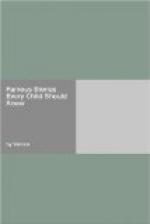He was a small boy of nine years at that time—a chubby-faced little man with rosy cheeks, big hazel eyes, and clusters of curls the brown of ripe nuts. His mother was dead, his father was poor, and there were many mouths at home to feed. In this country the winters are long and very cold, the whole land lies wrapped in snow for many months, and this night that he was trotting home, with a jug of beer in his numb red hands, was terribly cold and dreary. The good burghers of Hall had shut their double shutters, and the few lamps there were flickered dully behind their quaint, old-fashioned iron casings. The mountains indeed were beautiful, all snow-white under the stars that are so big in frost. Hardly anyone was astir; a few good souls wending home from vespers, a tired post-boy who blew a shrill blast from his tasseled horn as he pulled up his sledge before a hostelry, and little August hugging his jug of beer to his ragged sheepskin coat, were all who were abroad, for the snow fell heavily and the good folks of Hall go early to their beds. He could not run, or he would have spilled the beer; he was half frozen and a little frightened, but he kept up his courage by saying over and over again to himself, “I shall soon be at home with dear Hirschvogel.”
He went on through the streets, past the stone man-at-arms of the guard-house, and so into the place where the great church was, and where near it stood his father Karl Strehla’s house, with a sculptured Bethlehem over the doorway, and the Pilgrimage of the Three Kings painted on its wall. He had been sent on a long errand outside the gates in the afternoon, over the frozen fields and broad white snow, and had been belated, and had thought he had heard the wolves behind him at every step, and had reached the town in a great state of terror, thankful with all his little panting heart to see the oil-lamp burning under the first house-shrine. But he had not forgotten to call for the beer, and he carried it carefully now, though his hands were so numb that he was afraid they would let the jug down every moment.
The snow outlined with white every gable and cornice of the beautiful old wooden houses; the moonlight shone on the gilded signs, the lambs, the grapes, the eagles, and all the quaint devices that hung before the doors; covered lamps burned before the Nativities and Crucifixions painted on the walls or let into the wood-work; here and there, where a shutter had not been closed, a ruddy fire-light lit up a homely interior, with the noisy band of children clustering round the house-mother and a big brown loaf, or some gossips spinning and listening to the cobbler’s or the barber’s story of a neighbour, while the oil-wicks glimmered, and the hearth-logs blazed, and the chestnuts sputtered in their iron roasting-pot. Little August saw all these things as he saw everything with his two big bright eyes that had such curious lights and shadows in them; but he went heedfully on his way for the sake of the beer which a single slip of the foot would make him spill. At his knock and call the solid oak door, four centuries old if one, flew open, and the boy darted in with his beer, and shouted, with all the force of mirthful lungs, “Oh, dear Hirschvogel, but for the thought of you I should have died!”




